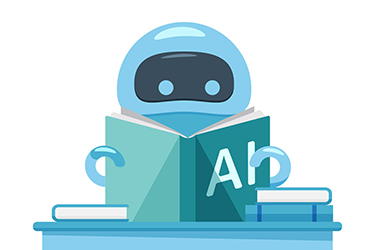Artificial intelligence
Artificial intelligence (AI) is transforming every aspect of our lives. It influences how we work and play. It promises to help solve global challenges like climate change and access to quality medical care. Yet AI also brings real challenges for governments and citizens alike.
As it permeates economies and societies, what sort of policy and institutional frameworks should guide AI design and use, and how can we ensure that it benefits society as a whole?
The OECD supports governments by measuring and analysing the economic and social impacts of AI technologies and applications, and engaging with all stakeholders to identify good practices for public policy.
What is the environmental footprint of artificial intelligence?
COP27 virtual session, 15 November 2022
AI-enabled technologies have huge potential to support positive climate action. From digital twin technology that models the Earth to algorithms to make data centres more efficient, AI applications already support the green transition. But AI systems also raise sustainability concerns linked to the natural resources they consume such as electricity and water, and the carbon emissions they produce.
As the use of AI increases, governments and policy makers need to understand AI’s environmental impacts so that they can make evidence-based decisions. This begs the question: what is AI’s environmental footprint?
This panel discussion during COP27 explored these issues and the new report "Measuring the environmental impacts of AI compute and applications: The AI footprint".
2nd International Conference on AI in Work, Innovation, Productivity and Skills
Virtual event, 21-25 February 2022
The 2nd International Conference on Artificial Intelligence in Work, Innovation, Productivity and Skills (AI-WIPS) brought together leading voices from the technical, policy, business, academic and civil society communities to present insights on the adoption of AI in firms and the workplace, ethics of its use, implications on skills, business dynamics, and productivity. It also saw the launch the OECD AI Systems Classification Framework.
As part of the OECD AI-WIPS project, this conference aimed to advance a global, multi-disciplinary and evidence-based policy debate to drive an adoption of AI in the world of work that is trustworthy, responsible, effective, beneficial and human-centered.
The effects of AI on the working lives of women
Virtual event, 8 March 2022
In celebration of International Women’s Day and in conjunction with the launch of a joint UNESCO-IDB-OECD report entitled “The effects of artificial intelligence on the working lives of women”, this online panel discussion mapped the unique opportunities and challenges that AI presents for the working lives of women and addressed the three overarching topics highlighted in the report: the changing skills requirements in the labour market, the effects of AI on women entering the labour force, and the impacts of AI on women’s work environment and career progression.
OECD.AI Policy Observatory
The OECD.AI Policy Observatory is a unique source of real-time information, analysis and dialogue designed to shape and share AI policies across the globe.
Its country dashboards allow you to browse and compare hundreds of AI policy initiatives in over 60 countries and territories.
An AI-powered tool also allows you to follow COVID-19 developments around the world.
The OECD.AI Policy Observatory also hosts the AI Wonk blog, a space where the OECD Network of Experts on AI and guest contributors share their experiences and research.
OECD Framework for Classifying AI Systems
Developed by the OECD.AI Network of Experts, the OECD framework for classifying AI systems aims to help policy makers, regulators, legislators and others to assess the opportunities and risks that different types of AI systems present, to inform their AI strategies and ensure policy consistency across borders.
The Framework is a user-friendly tool that links the technical characteristics of AI with policy implications, based on the OECD AI Principles that promote values such as fairness, transparency, safety and accountability and policies such as building human capacity and fostering international cooperation.
After a year of work, we held a public consultation through June 2021 to seek input from a broad range of stakeholders on the draft framework’s key components, user friendliness, and usefulness to assess AI system risk. The Framework was officially launched on 22 February 2022 during the OECD's International Conference on Artificial Intelligence in Work, Innovation, Productivity and Skills.
OECD Principles on Artificial Intelligence
The OECD Principles on Artificial Intelligence promote artificial intelligence (AI) that is innovative and trustworthy and that respects human rights and democratic values. They were adopted in May 2019 by OECD member countries when they approved the OECD Council Recommendation on Artificial Intelligence.
The OECD AI Principles are the first such principles signed up to by governments. They include concrete recommendations for public policy and strategy, and their general scope ensures they can be applied to AI developments around the world.
The OECD.AI Policy Observatory, launched in February 2020, aims to help policymakers implement the AI Principles.

Watch the replay of a high-level discussion about implementing the AI Principles in policies and practices. The event was streamed live as part of the OECD Ministerial Council meeting on 4 October 2021.
Publications and policy notes
- Identifying and characterising AI adopters: A novel approach based on big data (December 2022)
- Measuring the environmental impacts of AI compute and applications: The AI footprint (November 2022)
- Harnessing the power of AI and emerging technologies (November 2022)
- The effects of AI on the working lives of women, a collaboration between UNESCO, the IDB and the OECD (March 2022)
- Labour-saving technologies and employment levels: Are robots really making workers redundant? Policy paper (January 2022)
- Opportunities and drawbacks of using AI for training (December 2021)
- Artificial intelligence and employment: New cross-country evidence (December 2021)
- Responsible use of AI for public policy: Data science toolkit, joint report by the International Development Bank and the OECD (November 2021)
- AI and the Future of Skills, Volume 1: Capabilities and Assessments (November 2021)
- Venture capital investments in artificial intelligence: Analysing trends in VC in AI companies from 2012 through 2020. Digital economy paper (September 2021)
- The human capital behind AI: jobs and skills demand from online job postings. Policy paper (September 2021)
- Who develops AI-related innovations, goods and services? A firm-level analysis. Policy paper (September 2021)
- AI in business and finance. 2021 edition of the OECD Business and Finance Outlook (September 2021)
- AI, machine learning and big data in finance: Opportunities, challenges and implications for policy makers (August 2021)
- An overview of national AI strategies and policies. Going Digital Toolkit note (August 2021)
- Tools for trustworthy AI: A framework to compare implementation tools for trustworthy AI systems. Digital economy paper (July 2021)
- Artificial intelligence, its diffusion and uses in manufacturing. Going Digital Toolkit note (July 2021)
- State of implementation of the OECD AI Principles: Insights from national AI policies. Digital economy paper (June 2021)
- National strategies on AI: A European perspective. Joint JRC-OECD report (June 2021)
- Measuring the AI content of government-funded R&D projects. Working paper (June 2021)
- Laying the foundations for artificial intelligence in health. Working paper (June 2021)
- AI companies, goods and services: A trademark-based analysis. Working paper (May 2021)
- Demand for AI skills in jobs: Evidence from online job postings. Working paper (March 2021)
- Identifying and measuring developments in artificial intelligence. Working paper (May 2020)
- Using artificial intelligence to help combat COVID-19. This brief looks at the use of AI in detecting, responding to, and recovering from the coronavirus pandemic (April 2020)
- Trustworthy AI in health. Background paper for the G20 AI Dialogue, Digital Economy Task Force (April 2020)
- Trustworthy AI in education: Promises and challenges. Background paper for the G20 AI Dialogue, Digital Economy Task Force (February 2020)
- "Preparing for economic transformation through human-centred AI" is an OECD contribution (Chapter 3) to INSEAD’s Global Talent Competitiveness Index 2020: Global Talent in the Age of AI (January 2020)
- Hello, world: Artificial intelligence and its use in the public sector. This working paper is intended to help public officials take their first steps in exploring AI (November 2019)
- State of the art in the use of emerging technologies in the public sector. This working paper takes a look at major trends in AI and blockchain technology adoption in the public sector (September 2019)
- Artificial intelligence in society. A review of the technical and economic AI landscapes as well as major applications and uses of AI and their impacts. It explores salient public policy considerations and provides supporting information for the OECD Principles on Artificial Intelligence (June 2019)
- Private equity investment in artificial intelligence. This policy note describes important increases in investments in AI start-ups (December 2018)
- Artificial intelligence and machine learning in science and Artificial intelligence and the technologies of the next production revolution, chapters from the OECD Science, Technology and Innovation Outlook (November 2018)
- AI: Intelligent machines, smart policies. Discussions at the October 2017 OECD conference on AI are summarized in this digital economy paper (August 2018)
- Summary of the OECD Technology Foresight Forum on economic and social implications of AI (November 2016)





